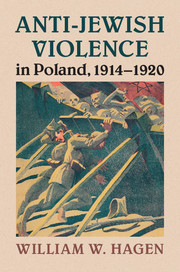Crossref Citations
This Book has been
cited by the following publications. This list is generated based on data provided by Crossref.
Holc, Janine
2019.
Against Anti-Semitism: An Anthology of Twentieth-Century Polish Writings. Ed. Adam Michnik and Agnieszka Marczyk. Trans. Agnieszka Marczyk. Oxford: Oxford University Press, 2017. xliii, 375 pp. Index. $34.95, hard bound..
Slavic Review,
Vol. 78,
Issue. 2,
p.
506.
Mick, Christoph
2019.
Legality, ethnicity and violence in Austrian Galicia, 1890–1920.
European Review of History: Revue européenne d'histoire,
Vol. 26,
Issue. 5,
p.
757.
Rybak, Jan
2019.
‘Universal Freedom’ and the Balfour declaration: watershed moments for radical Jewish politics.
European Review of History: Revue européenne d'histoire,
Vol. 26,
Issue. 5,
p.
783.
Miller, Michael L.
2019.
The Forgotten Pogroms, 1918.
Slavic Review,
Vol. 78,
Issue. 3,
p.
648.
Schmidt, Allison
2020.
Stowaways at Bohemia's Shores: Undocumented Emigration and People-Smuggling Networks in Interwar East Central Europe.
Central European History,
Vol. 53,
Issue. 3,
p.
564.
Piłatowicz, Józef
and
Tseligka, Eleni
2020.
Anti-Semitic resentments at the universities in the Second Polish Republic on the example of Lviv (1918-1939 AD).
Cogent Arts & Humanities,
Vol. 7,
Issue. 1,
p.
1801369.
Wierzbieniec, Wacław
2021.
The Consequences of the Lviv Pogrom on November 22–23, 1918, in Light of the Findings and Actions of the Jewish Rescue Committee.
Scripta Judaica Cracoviensia,
Vol. 18,
Issue. ,
p.
33.
Marzec, Wiktor
2021.
‘One of the oldest states in Europe has never suppressed any nation’. The minority treaty, nationalist indignation and the foundations of interwar ethnic democracy in Poland.
Nations and Nationalism,
Vol. 27,
Issue. 4,
p.
1080.
Lieberman, Benjamin
2021.
From Nationalism to National Indifference: Binary Logic and Sense of Time.
Nationalities Papers,
Vol. 49,
Issue. 5,
p.
855.
Brethour, Miranda
2022.
Life and Death In the shadow of Sobibór: economic dimensions of Jewish-Gentile relations in the town of Włodawa, 1939-1944.
Holocaust Studies,
Vol. 28,
Issue. 4,
p.
403.
Waligórska, Magdalena
2022.
Anti-Jewish Violence of Polish Troops, 1918–1920: The Case of Bobruisk.
East European Jewish Affairs,
Vol. 52,
Issue. 1,
p.
30.
Wierzejska, Jagoda
2023.
Była wschodnia Galicja w Polsce, Polska w byłej wschodniej Galicji. Obraz (wielo)narodowej prowincji w międzywojennej literaturze polskiej.
Markowski, Artur
and
Winiewski, Mikołaj
2024.
Social communication and the roots of anti‐Jewish violence in the Kingdom of Poland.
Conflict Resolution Quarterly,
Vol. 41,
Issue. 3,
p.
385.
Wierzejska, Jagoda
2024.
Neighbourhood – close hostility. A microhistorical study againstthe macrohistorical background of Lviv in the 1930s.
Tekstualia,
Vol. 1,
Issue. 76,
p.
17.
Cichopek‐Gajraj, Anna
2024.
Pogroms in Kraków in 1918 and 1945: Historical analysis.
Conflict Resolution Quarterly,
Vol. 41,
Issue. 3,
p.
253.





